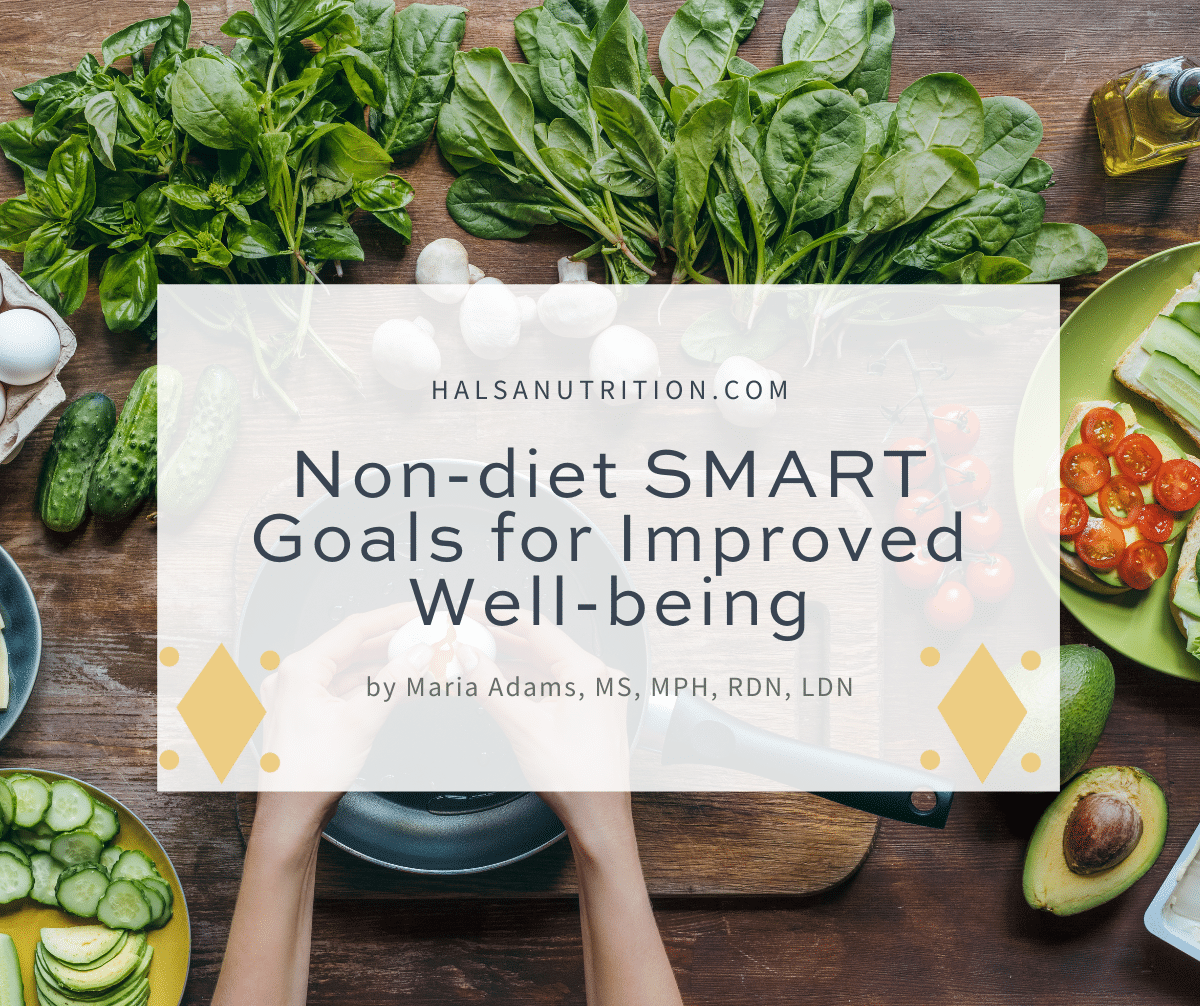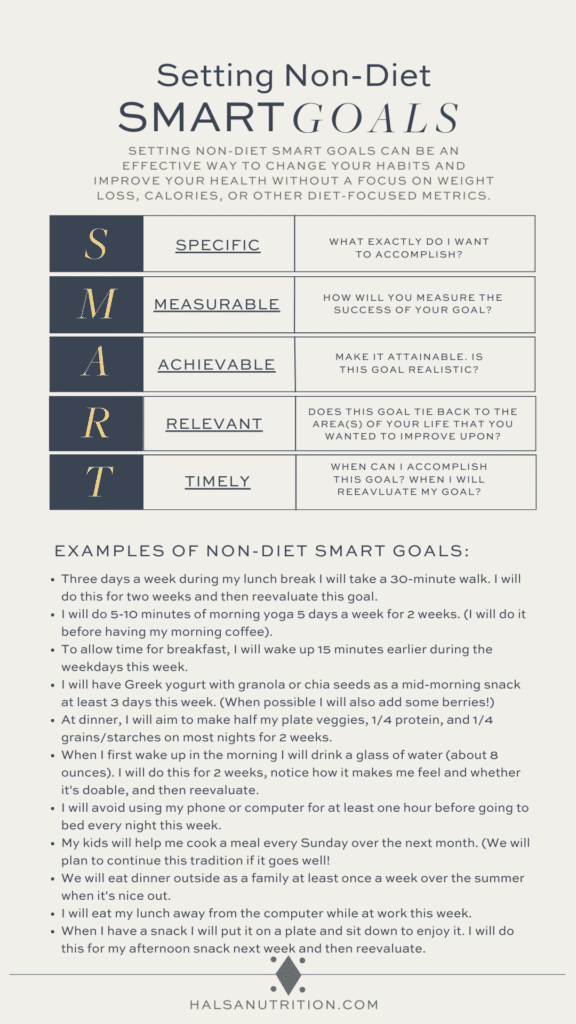
Non-diet SMART Goals for Improved Well-being
Setting non-diet SMART goals can be an effective way to improve your health without a focus on weight loss. Read on to learn more.
Have you heard of SMART goals? They can be used for effective personal goal setting, whether your goals are related to work, hobbies, or health. But when used to create health goals, they are often done so through a diet mentality approach. For example, they may focus on weight loss or trying to restrict certain foods.
This post will explain how you can make non-diet SMART goals that set you up for success.
What are SMART goals?
SMART is an acronym for specific, measurable, achievable, relevant, and timely. Making goals “SMART” generally makes them more likely to be successful. Here is a closer look at what each word means.
S – Specific
Be Specific. What is it exactly that you want to achieve?
M – Measurable
Make it measurable. How will you measure the success of your goal?
Note that while it’s important to have measurable goals, it’s also important to realize that when you miss the mark, it’s the goal that needs adjusting, not you! So don’t be so quick to call yourself a failure!
A – Achievable.
Make it attainable. Is this goal realistic?
How will you achieve this goal? Do you have the resources (time, money, desire, support) to make the changes needed to reach your goal? Does your accomplishment of this goal rely on anyone other than yourself?
R – Relevant
Make it relevant. Does this goal tie back to the area(s) of your life that you wanted to improve upon?
Consider how achieving this goal will help you. Will it help…
- improve your nutrition and overall well-being?
- you perform your best as an athlete?
- develop a healthier relationship with food?
- add more joy to your daily life?
T – Timely
Set a timeline. Make your goal time-specific.
How long do you want to work on this goal? (e.g., for the next week, for two weeks, for 1 month, 1 year*)
Is this timeline realistic?
*While it’s great to have long-term goals, it usually helps to break them down into smaller timelines that get reevaluated and updated as needed.

Who benefits from SMART goals?
SMART goals are helpful for anyone who is looking to make habit changes that lead to improved health and well-being and also enjoys setting goals. Having SMART goals can help prevent the New Year’s Resolution phenomenon where unrealistic and overly ambitious goals are often declared. SMART goals allow you to break your goals down into achievable baby steps. A key aspect of SMART goals is that they are time-specific. This lets you evaluate your progress and update your goals regularly.
If you don’t enjoy goal setting or would rather take a less structured approach to health goals, that’s okay too. You have to do what works and feels right for you.
What are examples of non-diet SMART health goals?
Here are some examples of non-diet SMART health goals. They are all different, but what they have in common is they follow the SMART structure and don’t focus on weight, calories, or other diet-related goals.
Walking goal:
- Three days a week during my lunch break I will take a 30-minute walk. I will do this for two weeks and then reevaluate this goal.
Yoga/morning stretching goal:
- I will do 5-10 minutes of morning yoga 5 days a week for 2 weeks. (I will do it before having my morning coffee).
Nutrition/food goals:
- To allow time for breakfast, I will wake up 15 minutes earlier during the weekdays this week.
- I will have Greek yogurt with granola or chia seeds as a mid-morning snack at least 3 days this week. (When possible I will also add some berries!)
- At dinner, I will aim to make half my plate veggies, 1/4 protein, and 1/4 grains/starches on most nights for 2 weeks.
Water/hydration goal:
- When I first wake up in the morning I will drink a glass of water (about 8 ounces). I will do this for 2 weeks, notice how it makes me feel and whether it’s doable, and then reevaluate.
Sleep and screen related goal:
- I will avoid using my phone or computer for at least one hour before going to bed every night this week. (In addition, I will leave my phone in the bathroom, not next to my bed, at night).

Parenting-related food goal:
- My kids will help me cook a meal every Sunday over the next month. (We will plan to continue this tradition if it goes well!
Hygge and mys goal:
- We will eat dinner outside as a family at least once a week over the summer when it’s nice out.
Mindfulness goals:
- This week I will eat my lunch away from the computer while at work.
- When I have a snack I will put it on a plate and sit down to enjoy it. I will do this for my afternoon snack, and other snacks if possible, all next week.
How can a dietitian help me with my SMART goals?
Working with a dietitian can help keep you accountable and motivated with your goals. You can review and change goals on a weekly, bi-weekly, or monthly basis depending on what works for you or when you see your dietitian. A weight-inclusive dietitian can also help you keep the diet mentality out of your goals. In addition, a dietitian can help you decide whether SMART goals are a good fit for you and if you need to take a step back and work on your overall relationship with food or exercise first.
Bottom line on non-diet SMART goals
Creating non-diet SMART goals can be a great way to tackle habit change–as long the behaviors are also something you enjoy. Also, remember that if you struggle to meet your goals it’s the goals that need to be tweaked and improved, not you!
Free SMART Goals Worksheet
Other posts you might like
- Find Your Joyful Movement
- A Fresh Approach to New Years Resolutions
- The Swedish Concept of “Lagom” and Intuitive Eating
About the author
This article was written by Maria Adams, MS, MPH, RDN, LDN, a registered dietitian and Certified Intuitive Eating Counselor. Maria takes a weight-inclusive approach and helps individuals rediscover the joy of food and eat to feel their best by healing from chronic dieting and disordered eating. She holds a Bachelor of Science Degree in Nutrition Science, a Master of Science in Nutrition Communication, and a Master of Public Health.

Leave a Reply